Bleak Britain
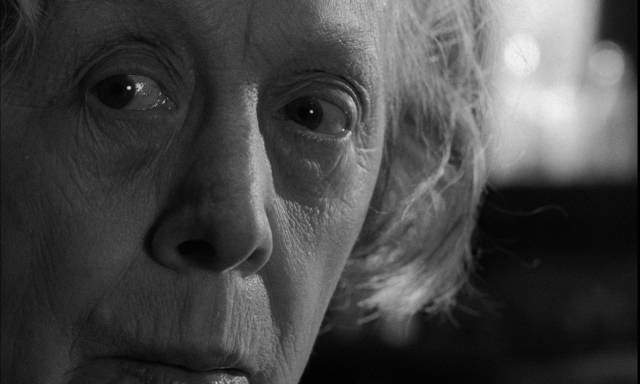
Britain as a nation, partly because of a deeply-rooted class system, has long had a split personality. The privilege of wealth, art and literature allied with the power of Empire gave the British an unquestioned arrogance for centuries … even the “lower classes” generally shared in the national sense of superiority. With the industrial revolution and the transplanting of the poor from a rural to an urban existence, the brutality of factory work and slum living, the old social bonds between rich and poor began to tear and throughout the Victorian Age the economic inequalities of British society became increasingly harsh – it’s not surprising that Marx wrote his major works in that environment.
By the time I came along in the early 1950s, those divisions and a couple of World Wars had created social fractures which have never gone away. For a while after the Second World War, the upward pressure from a working class which had done so much to save the country from destruction created a welfare state designed to ease if not eliminate the deep inequalities. But that working class power was under attack even back then, driving the traditional powers to do everything they could to restore the political and economic privileges of the “ruling class”, a project pretty much fulfilled by Margaret Thatcher, the country’s single most brutal political leader of the past half century.
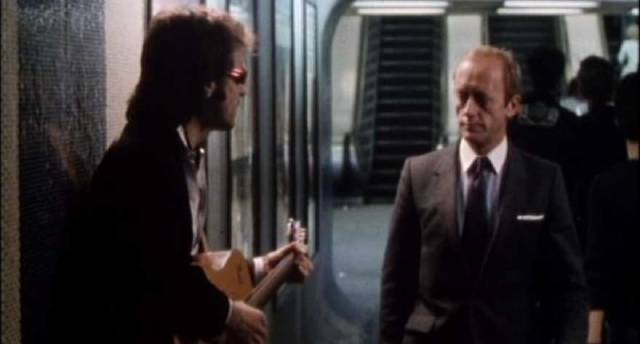
This domestic process was partly responsible for, and very much aggravated by, the dissolution of the Empire. Britain had spanned the globe, extending the nation to every continent, but now all those occupied countries were pushing for independence. There was some violence as Britain tried to hold on even after the inevitable had become obvious. The nation, having come through the war, saw itself shrinking (with the United States simultaneously expanding to fill the space). While still clinging to a self-image of greatness and importance, it was hard to avoid the knowledge that the old pride and arrogance no longer had even an illusory basis in reality.
My own impressions from childhood are of a gray and frequently bad-tempered place, full of angry people going at each other at every opportunity. Back then, the labour movement was largely united in demanding beneficial change for the working class and the establishment was becoming more aggressively resistant, trying to slow or even reverse the benefits labour had wrested from them in the aftermath of the War. That resistance pretty much achieved its goals with the crushing of the powerful National Union of Mineworkers by Thatcher in the mid-’80s, which weakened the entire labour movement and paved the way for unfettered Capitalist greed. (In the U.S., Reagan’s destruction of the Air Traffic Controllers had a similar aim and effect.)
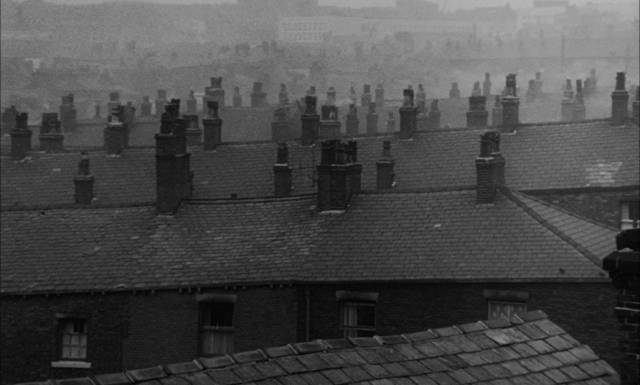
A lot of television shows, plays of the week and movies back in the ’60s were infused with bitterness and anger. The British New Wave of the late ’50s and early ’60s seemed radical because it began to show the country from a working class perspective where British culture had almost always been a top-down affair, with the lower classes relegated to comic relief; these movies were driven by anger and resentment. Whenever I go back there, I can still sense the gloom beneath the surface – closer to the surface now in the wake of the Brexit vote and the angry divisions it triggered. This atmosphere forms a background to many stories which may not address the history directly but can’t help but contain traces which colour the existence of characters who are just trying to get on with their lives – like much of the work of Ken Loach and Mike Leigh. These forces are apparent in a couple of otherwise very different movies I watched recently.
*
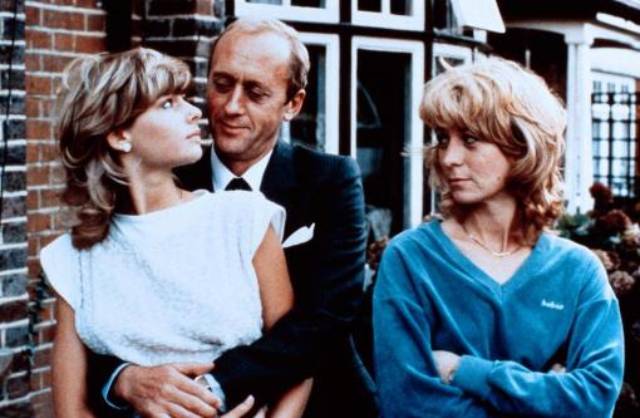
Return to Waterloo (Ray Davies, 1984)
As virtually a life-long Kinks fan (I started listening to them when I was around ten), I was thrilled more than two decades ago to discover Return to Waterloo (1984) on VHS. That tape has long since vanished, but I finally got around to picking the film up again on DVD and found that it still packs an emotional punch. Ray Davies somehow managed, seemingly without effort, to translate his rich musical style to a new medium. Waterloo is a kind of cinematic concept album – its closest relative in the Kinks’ discography is probably their 1969 masterpiece Arthur, or the Decline and Fall of the British Empire, but now reflecting the accelerating decline of Britain under Thatcher. Told almost entirely through images and music, the one-hour film paints a bleak picture which gathers a steadily increasing aura of dread as it progresses.
It begins in familiar territory – a suburban middle-class worker eats breakfast and takes leave of his wife (in a few brief strokes we see habit, boredom and disillusion, with hints of something more traumatic underlying the routine); he catches his commuter train and watches the world pass as he heads for his job in the city. Called simply The Traveller (Kenneth Colley), the man is weighed down by melancholy, seeming to see in everyone around him either some potential no longer available to him or presentiments of his own bleak future.
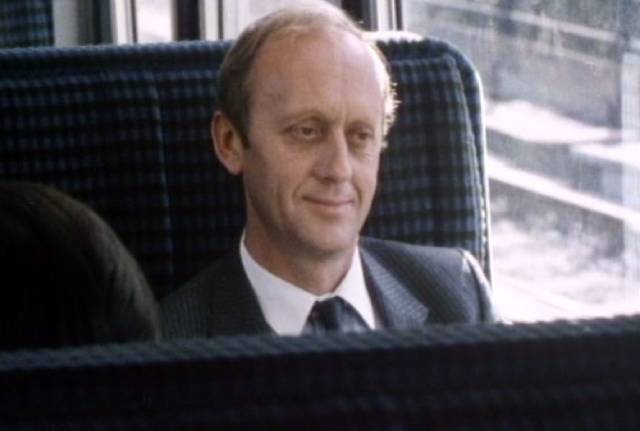
Davies uses repetition and a circular structure to reinforce a sense of being trapped, the dead end of that suburban life and the meaningless work that supports it. But gradually we glimpse individual details which separate The Traveller from the crowd which surrounds him. His marriage is damaged by the disappearance of his teenage daughter, about whom he and his wife wait futilely for news. From the train window, he glimpses young women who for a moment look like her, only to quickly turn back into strangers. This searching gradually becomes uncomfortable as his stares linger too long … and brief flashback glimpses begin to make his relationship with his daughter seem unhealthy; caught looking into her bedroom when she’s undressed. The suggestion of incestuous desire provides a possible motive for the girl’s running away, as well as The Traveller’s guilt-suffused melancholy.
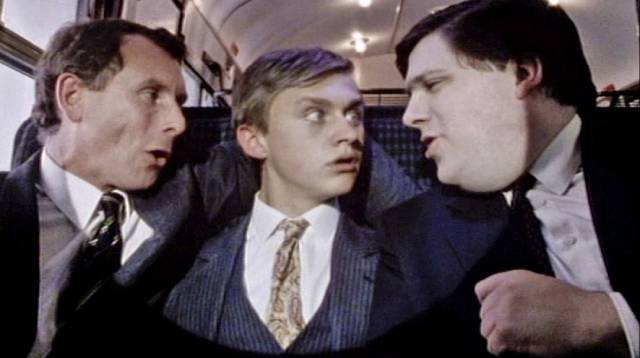
A fellow passenger is reading a tabloid beside him and on the front page is a police sketch of a serial rapist, who looks disturbingly like The Traveller, something not lost on some of the other people on the train. Despite the uncomfortable air of suspicion and incipient paranoia, he just can’t stop staring, his looks now loaded with unpleasant implications.
Meanwhile around him, Davies sketches in layers of generational conflict and anger. While The Traveller is caught in the hopelessness of the rat race, old people decry the decline of British power and the lack of gratitude and manners in the younger generation who surely should appreciate everything that has been passed down to them; and the young express aggressive contempt because what they’ve been handed amounts to nothing, no potential, no future.
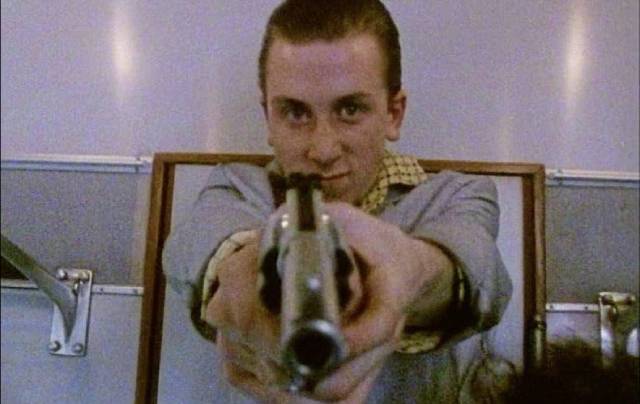
Davies directs with assurance, creating a bleak but nuanced portrait of a failed nation. Colley embodies that failure and the rot of hypocrisy which underlies it, while the rest of the cast invests a range of types (businessmen, gossiping women, cranky pensioners, sneering young punks) with sufficient individuality to prevent the compressed narrative from becoming merely schematic – the film captures a time and a place with living, breathing energy. The most recognizable face, other than Colley, is Tim Roth, who plays one of the young punks who harass the passengers with their aggressive contempt.
Return to Waterloo was shot by the great Roger Deakins right after Michael Radford’s 1984, making the brilliant cinematographer one of the key documentarians of the Thatcherite dystopia.
The 2017 Wienerworld DVD is fine, though it doesn’t contain the collection of Kinks music videos included on an earlier edition – but it would be nice to see a hi-def upgrade with remastered audio.
*
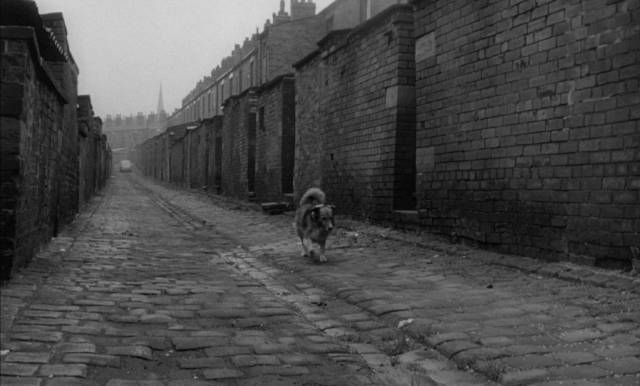
The Whisperers (Bryan Forbes, 1967)
Bryan Forbes is an interesting figure in British film. He started out as an actor in the mid-’40s, becoming a familiar face in supporting roles (he did a lot of war movies), and then began writing scripts in the early ’50s. After writing (and acting in) Basil Dearden’s heist movie The League of Gentlemen (1960), Forbes began directing. But although he was working at the same time as Tony Richardson, Karel Reisz, Lindsay Anderson and the other British New Wave directors, he never seemed a part of that movement. Perhaps it was because he didn’t seem particularly angry; rather than trying to shake things up, he concentrated on sensitive character studies. His work puts writing and acting at the forefront, telling stories in a naturalistic style which is at the same time both evocative and self-effacing.
And yet somehow, two of my earliest memories of the movies involve films by Forbes. I saw his first feature when I was six and it had a lasting effect on me, not least a long-term crush on Hayley Mills, who starred as a tomboyish farm girl in Whistle Down the Wind (1961). I was eleven when I saw The Wrong Box (1966), which I thought was one of the funniest things I’d ever seen. I still have an affection for it, though I can now recognize its weaknesses (it transforms Robert Louis Stevenson and Lloyd Osborne’s brilliant satire into something like a high class Carry On movie). Whistle Down the Wind, on the other hand, holds up really well despite an overly emphatic turn towards allegory near the end.
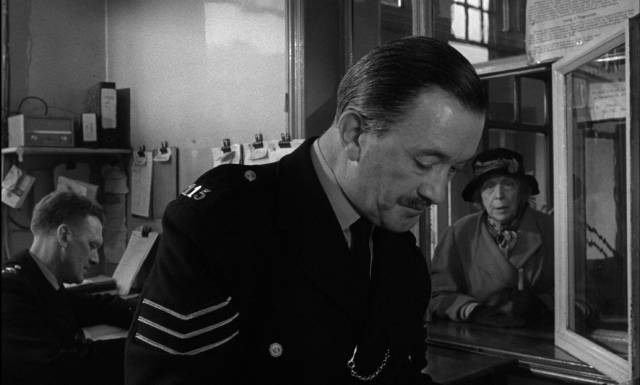
There’s no question that Forbes’ best work was in the 1960s – Whistle Down the Wind, The L-Shaped Room (1962), Seance on a Wet Afternoon (1964), King Rat (1965) – with his films becoming rather characterless by the turn of the decade – the mawkish The Raging Moon (1971), The Slipper and the Rose (1976), International Velvet (1978)… The only one that really stands out is The Stepford Wives (1975), but that’s more because of the high concept than the movie’s intrinsic qualities. His career as both a writer and director tapered off in the ’80s, ending with contributions to the script for Richard Attenborough’s Chaplin (1992), which has multiple writing credits.
I’ve always considered Forbes’ bleak domestic thriller Seance on a Wet Afternoon to be his masterpiece, a sad, pathetic study of hopeless people who, in trying to make something of themselves, do a terrible thing (though the adaptation softens the ending of Mark McShane’s even bleaker novel). But I may have to adjust that opinion now, as I’ve just seen for the first time his 1967 film The Whisperers.
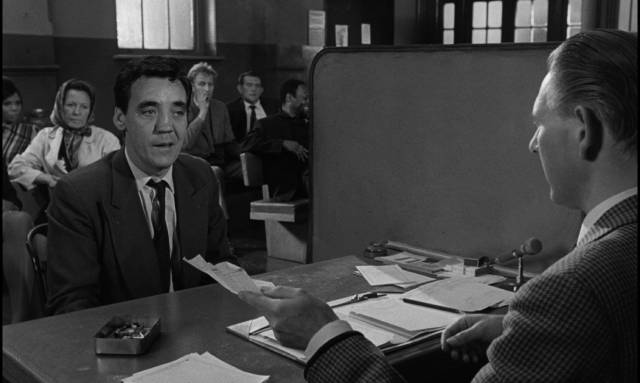
Watching The Whisperers is a strange and unsettling experience. It shows us the world through the mind of a confused and damaged character whose grip on reality has long-since become tenuous … and yet she’s absolutely unshakable in her certainty that the world is as she sees it. This is no quaint, dotty old eccentric such as Margaret Rutherford might have played in an Ealing comedy; rather, she’s a strong-willed woman who survives by remaking the world in a way that makes sense to her, even if that sense comes in the form of a paranoid nightmare.
The film originated in Forbes’ feeling that the British industry had failed to make proper use of the talents of one of the greatest actors of the century. A major figure in the theatre, Edith Evans had only occasionally had leading roles in films – most notably as Lady Bracknell in Anthony Asquith’s The Importance of Being Earnest (1952) – more often showing up in supporting roles. So Forbes bought the rights to a novel by Robert Nicolson and adapted it specifically for Evans, giving her the most remarkable role of her cinematic career.
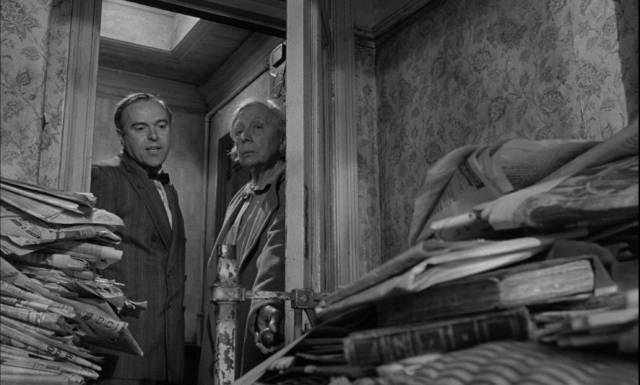
But a great performance can’t exist in a vacuum; it needs a setting to both support it and throw it into clear relief, and here Forbes does his finest work as a director. The world in which old Mrs. Ross lives can be seen as the breeding ground of her madness – the delusions which envelope her have grown from a grim and hopeless environment. Although made two decades after the War, the film is set in a seemingly ruined world … Mrs Ross lives in a run down tenement on the edge of an urban wasteland. The city remains unnamed although the film was shot in Manchester. It was in the throes of urban renewal at the time, undergoing massive slum clearances to make way for new housing developments, but visually what we’re shown is a world in collapse.
Mrs Ross exists here in a permanent state of suspicion, not only hearing noises from her upstairs neighbours – an interracial couple with a baby that cries loudly – but also voices which seem to speak to her from objects in her room. These voices tell her things, things which we can’t hear (a change from the book apparently, in which what they say is spelled out). The idea of a mixed race couple doesn’t fit with how she sees the world, so she assumes the young white women is being held hostage; when she urges the woman to make a run for it, she’s told to piss off and mind her own business and retreats fearfully to her room.
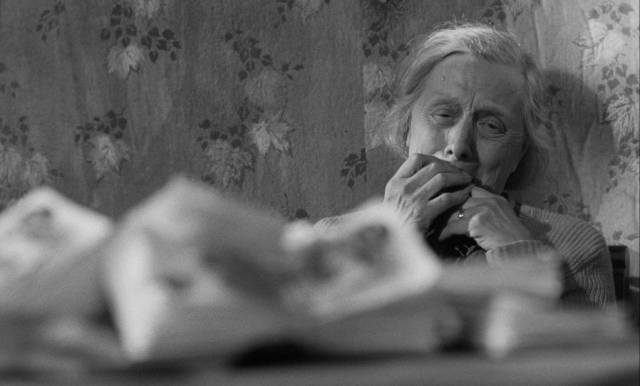
Her daily routine consists (after listening to the phantom voices) of walking through the ruins into town, where she stops in at the police station to complain about unseen figures spying on her, and now apparently sneaking in and moving things around while she’s not at home. The sergeant patiently listens, obviously having heard it all many times before, and assures her that they have a man working full time to keep an eye on her home.
Then she goes to the social assistance office, where Mr Conrad (Gerald Sim) does what he can to be helpful, as she asks for money for new shoes while explaining that she soon won’t need financial help because she’s expecting money any day now – from the sale of her father’s cattle in South America and investments in shipping concerns. Then it’s off to the local library where she has her own seat staked out beside the heating pipes; she slips off her shoes to warm her feet, until an employee glares at her for the impropriety. Then back across the wasteland to her flat and the noises from upstairs and the voices whispering things which confirm her suspicions about the world.
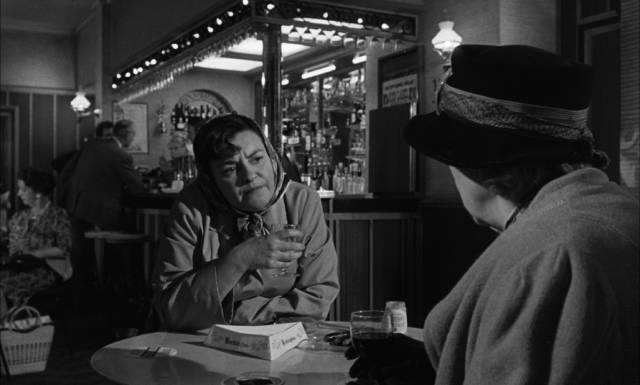
We gradually learn things about her life from which her paranoia may have grown. She was abandoned twenty years earlier by her husband, leaving her to fend for herself. Her son Charlie (Ronald Fraser) stops by and it’s quickly apparent that he’s a shady character; pretending to be visiting just to check on her, he disappears into the spare bedroom and hides a package on a high shelf in the wardrobe, then says he can’t actually stay to tea because he has to be somewhere else.
That package soon gives material form to her delusions and triggers a series of events which confirm her fantasies in strange and unexpected ways. When she finds it and discovers a large sum of (stolen) money, it becomes the inheritance she’s been telling people about – she can finally free herself of the humiliating dependence on social assistance. But it makes her vulnerable to a predatory woman and her family. Having been robbed and left lying in an alley, she comes down with pneumonia; the system attempts to help – Mr Conrad takes responsibility and tracks down the errant husband (Eric Portman). His well-meaning interference, persuading Archie Ross to move back in with her, doesn’t take into account her own view of her life. Finding herself living with a man she barely knows, while a psychologist assigned to her case tries to break down all the layers of defensive fantasy she’s built up over the years, causes her to retreat into suspicious silence.
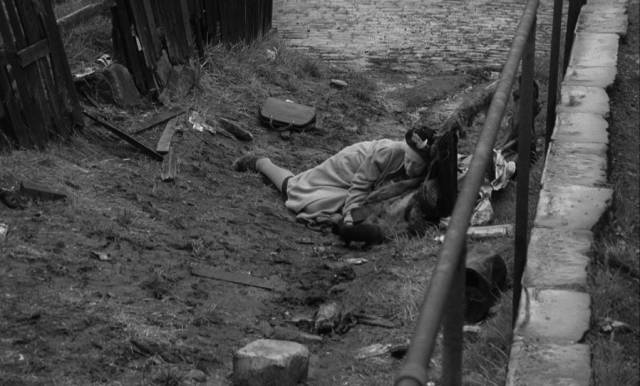
Although, seen from outside, Mrs Ross appears to be pathetic and at least slightly mad, she’s actually made a life which works for her – it’s the presence and actions of other people which end up destabilizing that life in ways which become distressing for her. As much as the system is there to provide her material support, it has no ability to comprehend the world she lives in and many of its efforts to help prove detrimental. And yet, that system, as intrusive as it is, does attempt to be supportive … it has yet to undergo the transformations which will eventually lead to the oppression and malevolence seen in Ken Loach’s I, Daniel Blake (2016), where decades of ideological retrenchment (Thatcher to Blair to Cameron) have redesigned it as a heartless machine for punishing those who dare to be poor in a world which worships greed and unjustified wealth.
But the paradox of the post-war welfare state was always that it tried to change material circumstances without fundamentally altering the class system and its attitudes. How can equality be achieved when a deeply held belief in upper class superiority triggers angry lower class resentments? Although living in grinding poverty, Mrs Ross has internalized attitudes which permit her to see herself as better than her surroundings; those class attitudes cast a negative aura over the system which is actually supporting her, and makes her fantasize ways to escape from it. The Whisperers is a fascinating character study which suggests tangentially why the post-war welfare state eventually collapsed despite initially offering hope for radical change.
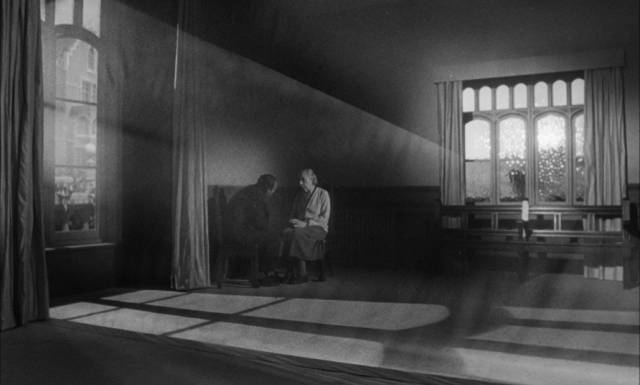
The 2K transfer on Kino Lorber’s Blu-ray looks absolutely gorgeous (paradoxically!). Gerry Turpin’s black-and-white photography adds detail and nuance to every image, giving the bleak world inhabited by Mrs Ross a visceral density which reinforces every grim moment of the story. The combination of Forbes’ fine script, superb performances – Evans is well-supported by an excellent cast – Turpin’s striking photography and a powerful use of real locations results in one of the best British films of the ’60s.
A commentary from Kat Ellinger is included.
Comments